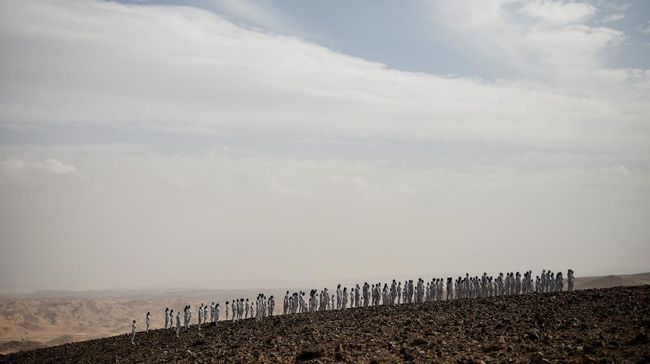Jakarta, CNBC Indonesia – Hundreds of people, both men and women, naked and wearing only white body paint. They walk across a stretch of desert near the Dead Sea, a lake that stretches between Israel, Palestine and Jordan, Sunday (17/10/2021).
This phenomenon is part of the latest photography project by an artist from the United States (US), Spencer Tunick (54). This photoshoot was taken to highlight the phenomenon of climate change (climate change) is happening in the world.
Reported from South China Morning Post (SCMP), Tunick worked on a project to depict the ever-shrinking Dead Sea through nude subjects. With this project, he visited Israel as a guest of the tourism ministry.
This idea came about after the shores of the Dead Sea receded by about a meter in the past year. Even his shooting location near the Dead Sea five years ago receded and left only crusty sand, exposing a gaping sinkhole.
As is known, climate change is a real threat in the world besides the Covid-19 pandemic. This phenomenon not only affects the environment, but also the economy.
Scientists have also studied how carbon emissions, which are one of the reasons for climate change, will affect the world in 2021.
This is not only happening in the Middle East, but also haunting Europe, the US and Asia. Where storms and rains that are more severe than usual and cost lives arise due to environmental problems.
In a recent study from the US, if nothing changes, 95% of Earth’s sea level will be uninhabitable by 2100. Rising levels of CO2 (carbon dioxide) in the atmosphere, over at least three million years, make sea surface temperatures likely to become less species-friendly. who live there, as quoted from Nature World News.
Seas that are hotter, more acidic, and have fewer of the minerals needed for marine life to thrive make them uninhabitable to marine creatures. According to researcher Katie Lotterhos of the Northeastern University Center for Marine Science, changes in ocean composition due to carbon pollution are likely to affect all surface species.
Meanwhile, from an economic perspective, McKinsey’s latest analysis states that the potential loss due to the climate crisis could reach US$ 4.7 trillion or around Rp. 66,188 trillion (assuming Rp. 14,000/US$). The Ministry of National Development Planning/Bappenas RI also estimates that economic losses due to the impacts of climate change could reach Rp 115 trillion in 2024.
The financial sector has now detected an increased risk of major floods, typhoons and droughts. At the global level, Environmental, Social and Corporate Governance (ESG) investment has seen a wave of growth in the wake of the pandemic and has a renewed focus on sustainability.
In Southeast Asia, business models that prioritize sustainability, climate risk assessment and ESG investment are still relatively new. However, the effects of climate change are already being felt.
(boss / boss)
– .

/nginx/o/2021/10/19/14149986t1hfd10.jpg)
